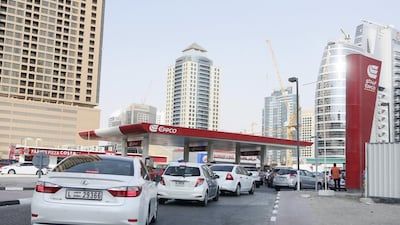The UAE’s planned government spending cuts will clip 1 per cent off annual economic growth between now and 2020, the IMF said yesterday in its annual update on the country’s economy.
The UAE Government plans to cut spending by 4.2 per cent in 2015 – the country’s first spending cut in 13 years. Spending this year will fall to Dh460 billion, down from Dh480bn in 2014, as the Emirates attempts to shake off the fiscal impact of low oil prices and slowing government revenues.
The country has made cuts to energy subsidies and grants, after Abu Dhabi cut electricity tariffs in January, and a nationwide reduction of petroleum subsidies came into effect on August 1.
That will lead to reduction in government outlays this year of 0.1 per cent of GDP, the IMF said, and to savings of up to 0.6 per cent of GDP annually from next year.
These spending plans mean that the UAE will reach “intergenerational equity” by 2020 – the point at which current levels of per capita government spending can be maintained indefinitely, according to the IMF.
Zeine Zeidane, the IMF’s mission chief to the UAE, said that the Government had opted for “a faster pace of consolidation” than one suggested by the fund in order to minimise the impact on the country’s sovereign wealth fund holdings.
“We clearly support resuming fiscal consolidation,” Mr Zeidane said, “but the UAE already has a lot of fiscal space, and our recommendation is that they don’t need to consolidate as quickly.
“[The spending cuts are] already having an impact on economic outlook. We want them to focus on an outlook that maintains economic growth.”
Mr Zeidane said the UAE could reach the point of intergenerational equity by 2025 instead – and that this would impose a smaller penalty to economic growth of about 0.5 per cent of GDP.
The IMF said in its staff report that it believed the UAE’s current spending plans were “realistically implementable”.
Informal measures of activity in the UAE’s non-oil sector, published yesterday by Emirates NBD, showed an improvement in economic conditions.
The UAE’s Purchasing Managers Index (PMI) came in at 55.8 for July, up from 54.7 the previous month, which was the measure’s weakest level in 22 months. A reading above 50 indicates expansion of the economy.
“Output and new orders both rose at sharper rates, contributing to a robust overall improvement in business conditions,” Emirates NBD said. “Job creation was also sustained at a solid pace.”
The PMI rise was “another indication that growth in the UAE’s non-oil economy is proving resilient in the face of a challenging regional and global economic environment,” said Jean-Paul Pigat, a senior economist at the bank.
“The rebounds in output and new orders were particularly encouraging and we expect this momentum to continue through the remainder of 2015.”
Private sector employment rose for the 43rd consecutive month and Emirates NBD noted that a number of survey panellists associated the workforce growth with the start-up of new projects.
Saudi Arabia’s PMI also rose in July, to 57.7 from a record low of 56.1 in June.
“Strengthening new export orders appear to lie behind the improvement in activity,” said William Jackson, an economist at Capital Economics.
abouyamourn@thenational.ae
amcauley@thenational.ae
Follow The National's Business section on Twitter

